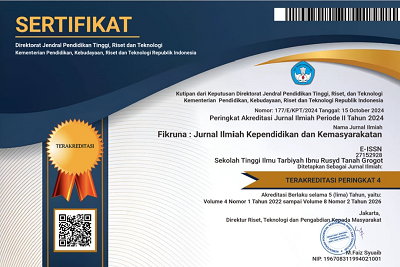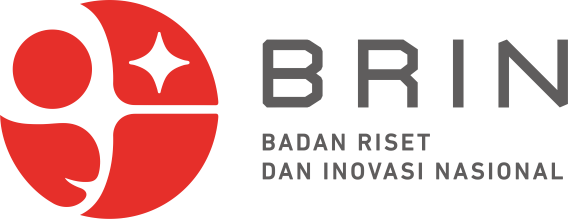TRANSFORMASI DIGITAL PEMBELAJARAN PAI: PERAN BLENDED LEARNING DALAM MENINGKATKAN HASIL BELAJAR SISWA
Abstract
This study aims to analyze the effect of the blended learning model on the Islamic Education (PAI) learning outcomes of fifth-grade students at SD Islam Al Azhar 47 Samarinda. The background of the research is based on the importance of innovative learning approaches to improve learning outcomes, while the implementation of blended learning at the school has not yet been optimal. The method used is quantitative with a pre-test and post-test design involving 56 students. Data were collected through questionnaires, observations, and interviews, and then analyzed using normality tests, homogeneity tests, t-tests, and linear regression. Validity testing showed that 53 out of 60 items were valid, with the reliability coefficients for variable X (0.835) and variable Y (0.858), indicating that the research instruments are reliable. The trial results showed an increase in the average PAI score to 80.357. Normality and homogeneity tests confirmed that the data were normally distributed and homogeneous. The hypothesis test using the paired sample t-test resulted in a Sig. (2-tailed) value of 0.000 (< 0.05), indicating a significant effect. Meanwhile, the linear regression analysis showed a coefficient of determination (R) of 0.446, meaning that 44.6% of the improvement in PAI learning outcomes was influenced by blended learning. The conclusion of this study proves that blended learning has a positive effect on students PAI learning outcomes. Its implication is that this model can be optimized as an innovative learning strategy in elementary schools. Recommendations for teachers and school administrators include enhancing technology training and providing supporting infrastructure to maximize the effectiveness of blended learning.
References
Aditia Rachman, Yusep Sukrawan, dan Dedi Rohendi, �Penerapan Model Blended Learning dalam Peningkatan Hasil Belajar Menggambar Objek 2 Dimensi�, dalam Journal of Mechanical Engineering Education, Vol. 6. No. 2, 2019, h. 151.
Agus Wasisto Dwi Doso Warso, Mengenal Penelitian Tindakan Kelas dan dilengkapi Contohnya, (Yogyakarta: Deepublish, 2021), h. 29.
Akhbar Galang M, Wahyuni Suryaningtiyas, Febriana Kristanti, �Penggunaan Model Pembelajaran Blended Learning terhadap Hasil Belajar Matematika Kelas VIII di SMPN 38 Surabaya, dalam Journal of Mathematics Education, Science and Technology, Vol. 1, No. 1, 2016, h. 19.
Fendika Prasetiyo, Peningkatan Hasil Belajar Peserta Didik dengan Model Kooperatif Jigsaw Pada Materi Pecahan kelas V di SDN Sepanjang 2, (Surakarta, CV KEKATA GROUP, 2019).
Gede Sandi, � Pengaruh Blended Learning terhadap Hasil Belajar Kimia Ditinjau dari Kemandirian Siswa�, dalam Jurnal Pendidikan dan Pengajaran, No. 3, Jilid 45, 2012, h. 249.
Hadion Wijoyo, dkk, Blended Learning Suatu Panduan, (Solok: Insan Cendikia Mandiri, 2020).
Kharisma Afanda Puspita, �Pengaruh Model Pembelajaran Blended Learning terhadap Hasil Belajar Siswa Sekolah Dasar�, dalam Jurnal Pendidikan, Vol. 14, No. 1, 2023, h. 96.
M. Quraish Shihab, Membumikan Al-Qur�an, (Bandung: Mizan, 2003).
Maesaroh, �Pengaruh Blended Learning terhadap Proses dan Hasil Belajar Siswa pada Mata Pelajaran Fiqih di MTS Negeri 12 Majalengka�, dalam Jurnal Ilmiah Kajian Islam, No. 2, Vol. 4, 2020.
Moh. Suardi, Belajar dan Pembelajaran, (Yogyakarta: Deepublish, 2018).
Ni Komang Susmariani, I Wayan Widiana dan I Nyoman Rasmen Adi, �Pengaruh Model Pembelajaran Inkuiri Terbimbing Berbasis Blended Learning dan Kemandirian Belajar Terhadap Hasil Belajar Matematika Siswa Sekolah Dasar�, dalam Ilmiah Pendidikan Citra Bakti, Vol. 9, No. 1, 2022, h. 238.
S. Nasution, Metode Research, (Jakarta: Bumi Aksara, 2009).
Siti Ambarli, Zulfiati Syahrial, Mochammad Sukardjo, �Pengaruh Model Blended Learning Rotasi dan Kecerdasan Intrapersonal terhadap Hasil Belajar IPA di SMP�, dalam Jurnal Visipena, Vol. 11, No. 1, 2020, h. 30.
Siti Farhatus Tsaniyah, Hena Dian Ayu, dan Hestiningtyas, �Pengaruh Model Blended Learning Menggunakan Schoology terhadap Prestasi Belajar ditinjau dari Kemandirian Belajar Ssiwa�, dalam Jurnal Terapan Sains & Teknologi, Vol.1, No. 1, 2019, h. 75.
Sugiyono, Metode Penelitian Pendidikan: Pendekatan Kuantitatif, Kualitatif, dan R&D, (Bandung: Alfabeta, 2017).
Sulihin B. Sjukur, �Pengaruh Blended Learning terhadap Motivasi Belajar dan Hasil Belajar Siswa di Tingkat SMK�, dalam Jurnal Pendidikan Vokasi, Vol. 2, No. 3, 2012, h. 376.
Taufik Mukmin, �Urgensi Belajar dalam Perspektif Al-Qur�an Surat Al-Alaq ayat 1-5 Menurut Tafsir Ibnu Katsir�, dalam Jurnal el-Ghiroh, No. 02, Vol. XI, 2016, h. 14.
Yunika Lestaria Ningsih, Misdalina, dan Marhamah, �Peningkatan Hasil Belajar dan Kemandirian Belajar Metode Statistika Melalui Pembelajaran Blended Learning�, dalam Jurnal Pendidikan Matematika, Vol. 8, No. 2, 2017, h. 162.
Copyright (c) 2025 Agus Setiawan, Elya Maslichatul Wahidah, Mukhamad Ilyasin

This work is licensed under a Creative Commons Attribution-NonCommercial 4.0 International License.



.png)












